We have already characterized foreign travel by Poles in accordance with various criteria. So far, on the basis of a pilot survey described in Travel Search Trends 2020. Part 1 – Characteristics of the respondents onducted by the Qtravel agency, we have characterized the respondents in accordance with basic demographic features (gender, age, place of residence, education, occupational situation, and income level). In subsequent episodes of the series, we also analysed the characteristics of the trips undertaken by Poles, including the frequency of trips per year, the number of trips by gender, and the correlation of trip frequency with the level of earnings, the number of overseas/domestic trips, and the length of tourist stays (by income group, gender, and education).
This time, just as we announced in part 7 Travel Search Trends 2020. Part 7 – how far in advance do we plan tourist trips? – the income factor we will try to look at other aspects of travel planning – in particular we will assess the flexibility with which different income groups treat selected elements of a travel package (transport, hotel, travel distance, etc.).
191 people provided information about their income in the survey, of which the largest group were those who declared a total net income in the range of PLN 2,000 – 15,000 and this group was further analysed. Subgroups with incomes of PLN 2,000 – 4,000, PLN 4,000 – 6,000, PLN 6,000-8,000, PLN 8,000 – 10,000 and PLN 10,000 – 15,000 per month were also identified to observe how they are similar in the flexibility with which they approach the issue of various criteria at the stage of planning a leisure trip.
The first of the presented graphs illustrates the flexibility with which we approach each criterion at the travel planning stage, regardless of the income level. The question of choosing our companions comes to the fore (whether we travel with family, with friends, in a large group, or perhaps with one beloved person, and whether the type of other guests in the hotel matters to us, etc.) In relation to this criterion, the level of flexibility indicated by almost half of the respondents is extremely low, which means that we attach great importance to the selection of people who accompany us during travel and holidays. No other criterion, as the survey results indicate, is as important. Even dates of departure, which only few people can be fully flexible about (the availability of holiday leave often requires arrangements with the employer and finding a substitution at work), came only second. This means that we consider the selection of the company as the key factor of a successful holiday, more important than a whole spectrum of other aspects, even including the factors that affect the price (e.g. transport and accommodation).
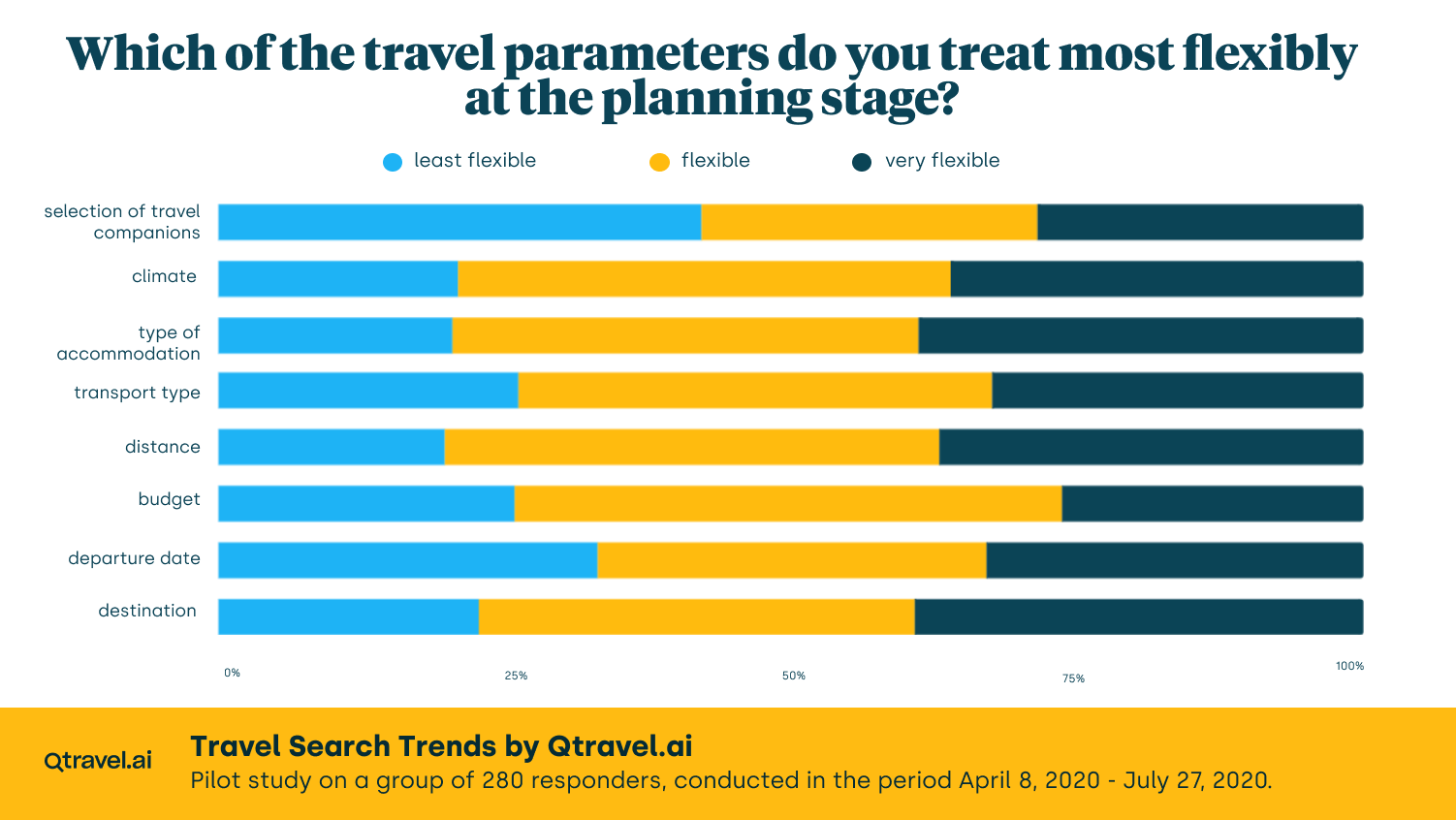
In contrast, we are most flexible with regard to the travel destination (over 40% of indications), the type of accommodation (equally 40%), the distance we intend to travel (34%) and the climatic conditions at the travel destination (36%). The latter aspect turned out to be quite a surprise, because it would seem that Poles would be more determined to find excellent weather conditions when choosing a destination. Apparently, however, well-chosen companionship has a significant advantage over the weather.
Breaking the group of respondents into smaller income clusters helps to reveal some nuanced perception of flexibility of individual holiday trip planning criteria.
In the lowest income group (PLN 2,000 – 4,000), of course, travel companionship is still the least flexible factor, but budget flexibility is also clearly low. However, the attitude towards the destination and type of accommodation is very flexible (probably because you can afford significant savings here – at the price of comfort, of course). Low flexibility in this income group also applies to the type of transportation(an important factor in the price of travel), and thus to distance (which is closely related to transportation and the ability – or inability – to travel long distances) What is not entirely clear in this group, however, is the attitude towards departure dates: most respondents carefully selected the ‘moderately flexible’ answer. Probably the reason for this is both the necessity to agree on holiday dates with the employer and the temptation to look for ‘last minute’ offers, which allow significant savings and taking attractive trips despite budget constraints.
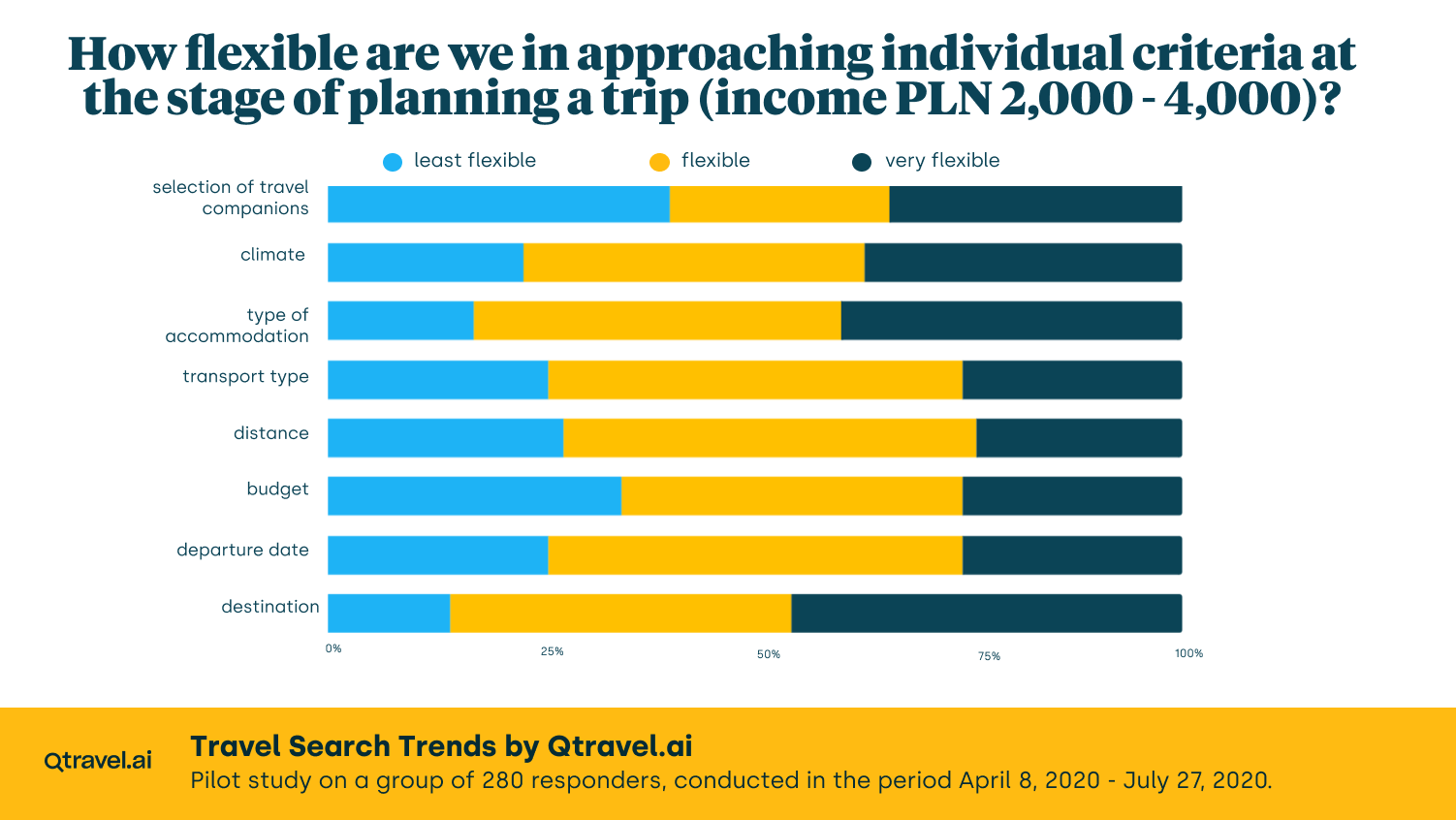
In the next income group (PLN 4,000 – 6,000), the issue of choosing travel/holiday companionship proved to be extremely important (as many as 52% indicated that they are very inflexible in this aspect). As far as other issues are concerned, representatives of this group remain relatively (e.g. budget, climate, distance) or very flexible (type of accommodation, dates and destination).
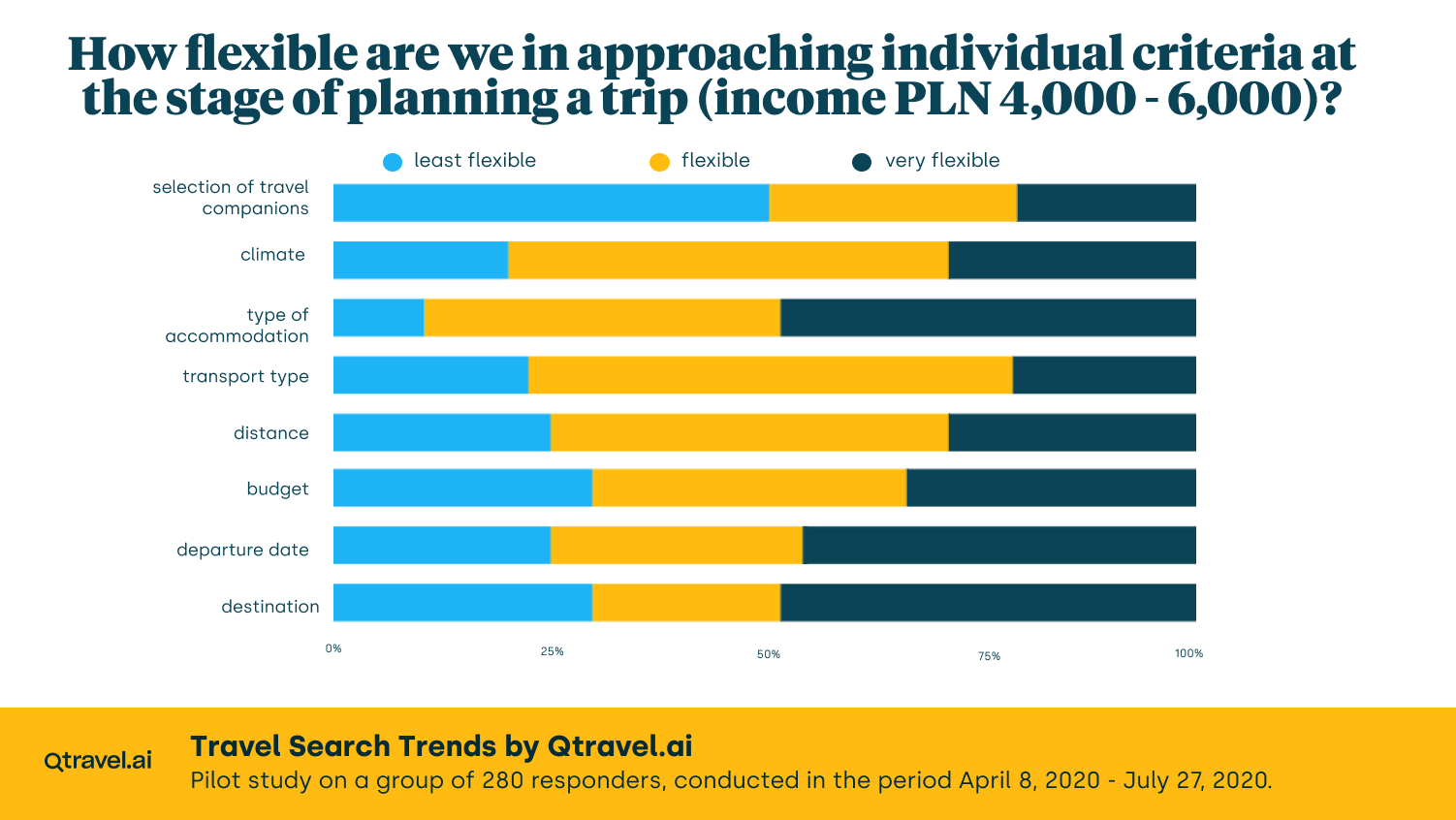
In the group of respondents who declare an income in the range of PLN 6,000 – 8,000), the first place in terms of importance (and thus low flexibility) is still held by accompanying persons (although the dominance of this factor is not as high as in the group of PLN 4,000 – 6,000), while the issue of departure dates turns out to be equally inflexible (in both cases responses indicating low flexibility were chosen by 33% of respondents). However, it should be noted that this income group had the highest number of responses indicating a medium level of flexibility for most criteria. On the other hand, the highest flexibility concerned the choice of transport (almost half of the respondents chose this answer), as well as the type of accommodation (46%), destination (42%), distance and climate at the destination (in both cases almost 40% of the answers). The income bracket in question is also characterized by the lowest number of responses indicating definitely low flexibility in any aspect. Arguably, this level of income can be considered to guarantee some freedom of choice regardless of price and organizational considerations.
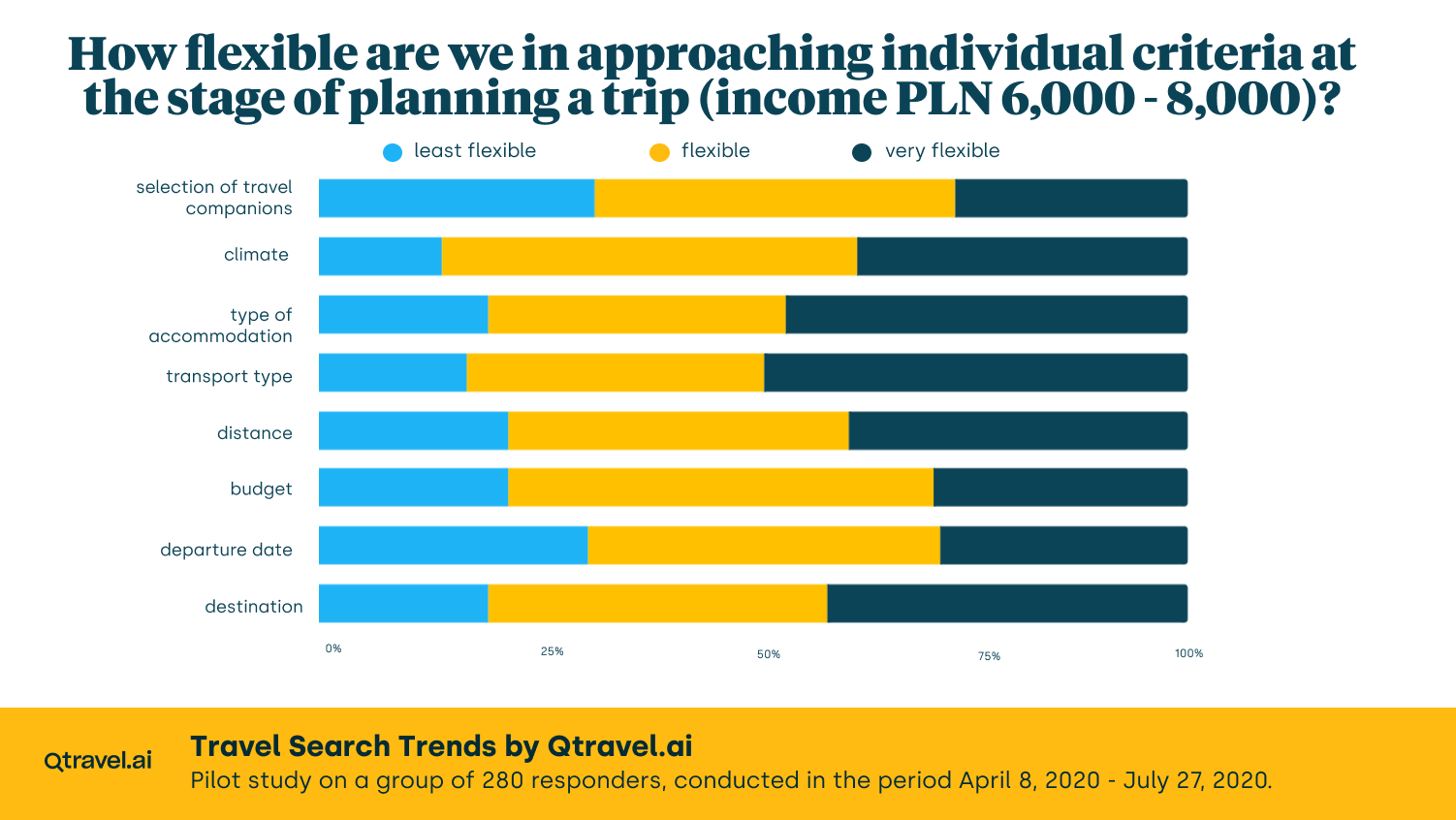
The group that declares an income of PLN 8,000-10,000, just like all the other groups, turns out to be very sensitive when it comes to choosing holiday company (50% of people indicated a lack of flexibility in this area). On the other hand, lower flexibility than in other groups was indicated with respect to dates of departure (almost 40% of indications), type of transport (35%), and destination (26%). This time, however, it should be suspected that it is not so much inflexibility caused by looking for the lowest possible price, but rather a low willingness to give up comfort, which is expected in this group during a holiday trip. It should be emphasized here that other survey questions have determined the highest percentage of people declaring long-distance travels in the discussed income group, choosing air transport (which is relatively expensive) and high-class hotels (4- and 5-star). This observation is further corroborated by the highest proportion of people who indicate medium and high flexibility in terms of budget (almost 90% of people in total). It should also be noted that it was in this income bracket that the answer ‘medium flexibility’ was selected for most questions, which means that even if respondents did not declare total freedom, they did not feel significant constraints at the stage of travel planning.
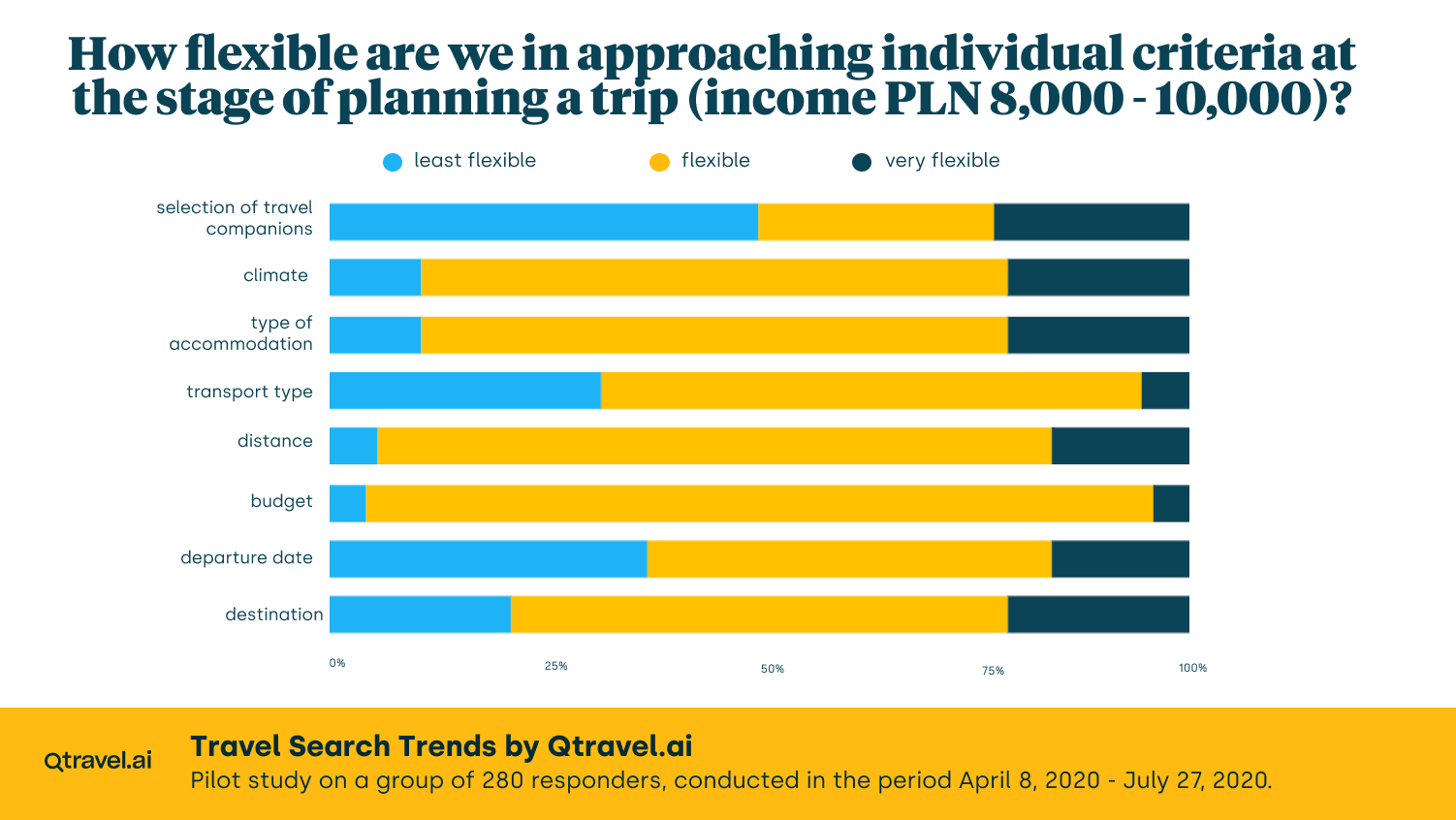
The last of the selected target groups includes people who declared a monthly net income in the range of PLN 10,000 – 15,000. In this group, the issue of choosing companions was more important than in all other income groups, with nearly 60% of respondents describing their flexibility in this aspect as definitely low. Perhaps one should accept the interpretation that for the affluent, other aspects remain simply a matter of price, whereas companionship is a value that is difficult to obtain on the market 😉 A large proportion of the respondents (53%) also highlighted low flexibility in terms of departure date. In contrast, at least medium and often high flexibility was indicated for the other criteria This was particularly true with regard to climate (high flexibility was declared by over 50% of respondents), the destination, and the associated distance (both by nearly 40% of respondents). Particularly interesting to the researchers is the question about distance – in this income group, more than 90% of people do not pay attention to the distance of their trips(the answer was ‘high’ or ‘medium’ flexibility, and only in 10% of the answers distance was a barrier that could not be treated flexibly). A similar attitude applies to the budget – just under 20% of respondents in this income group cannot treat their travel budget flexibly.
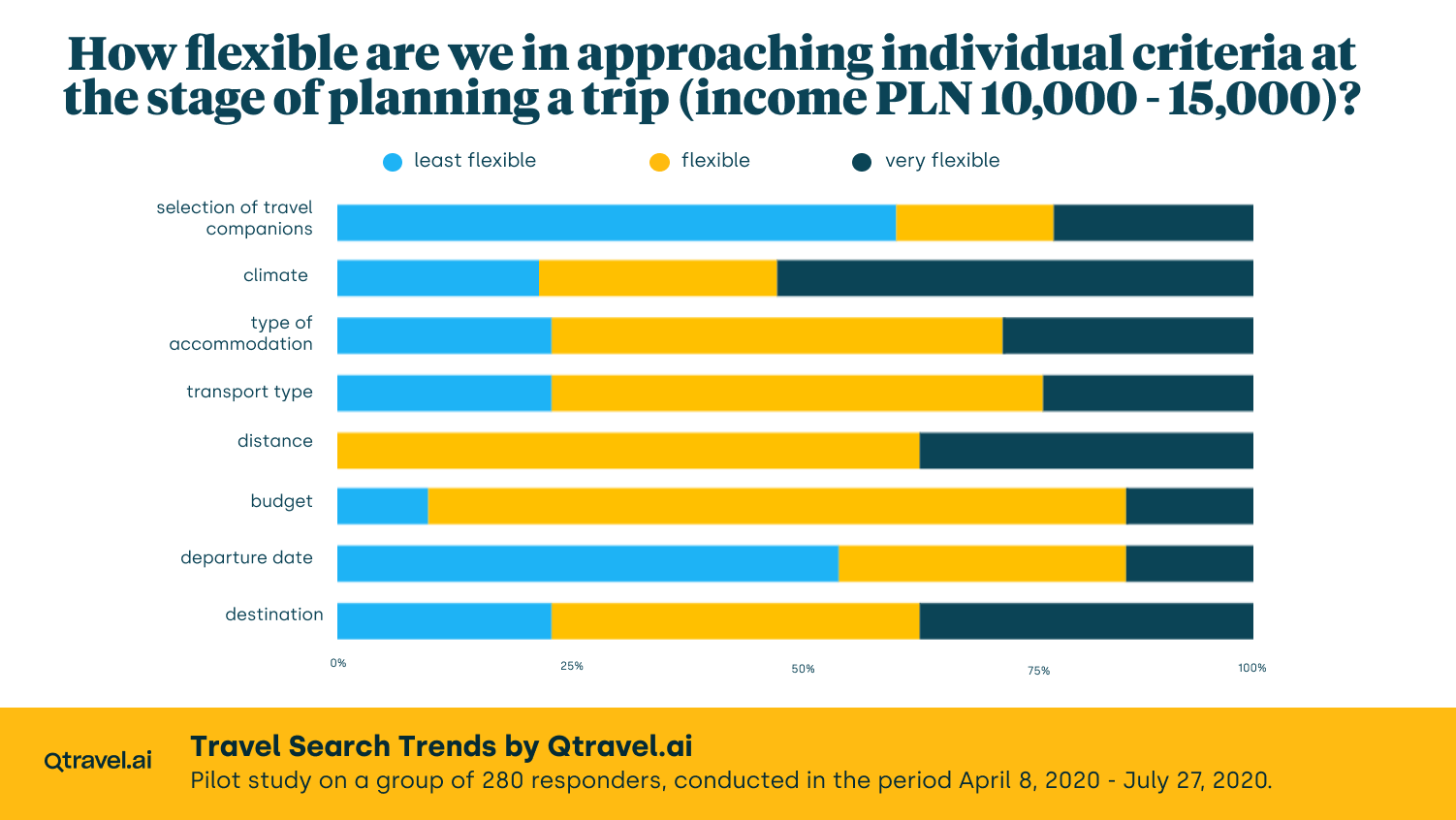
Income at the level of more than PLN 15,000 or less than PLN 2,000 was declared by only a few respondents, and therefore their answers were left out in the presented analysis as not representative. The general conclusion in this part of the investigation, however, is the observation that, regardless of income level, we pay a lot of attention to companionship when we travel, and we are willing to change other aspects at the stage of planning a trip, so that we can spend our holiday with people whose company we consider particularly important. For the other criteria, a lot depends on the level of income we earn: lower income thresholds make us carefully weigh the budget and the related issues of transportation, accommodation, distance, and destination. There is also little flexibility with regard to the timing of trips, regardless of income.
We encourage you to read the rest of the articles in this series:
- Part 1: Profile of the respondents.
- Part 2: How often do tourists travel during the year?
- Part 3: Do we like long holiday stays in Poland?
- Part 4: Poles travelling abroad part 1.
- Part 5: Poles travelling abroad part 2.
- Part 6: How far in advance do we plan tourist trips?
- Part 7: How far in advance do we plan tourist trips? – the income factor.
- Part 8: Flexibility in holiday travel planning.
- Part 9: Frequency of travel versus flexibility in travel planning.
- Part 10: Gender versus flexibility in travel planning.
